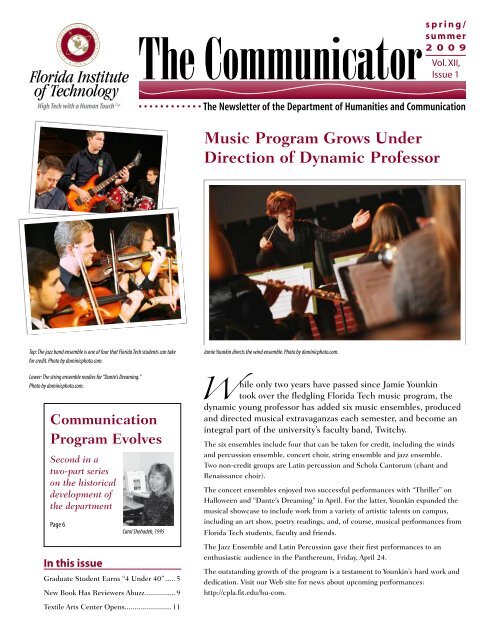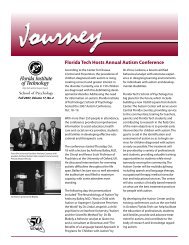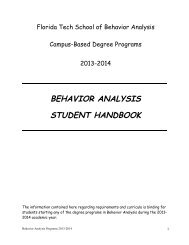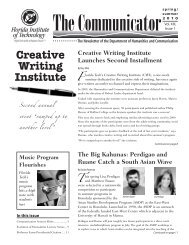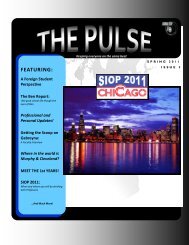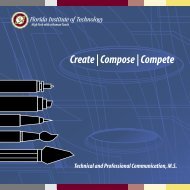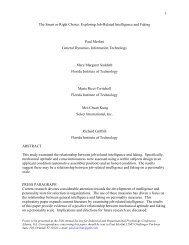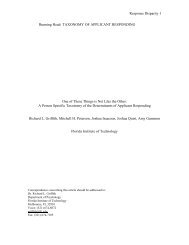Spring/Summer 2009 - College of Psychology and Liberal Arts
Spring/Summer 2009 - College of Psychology and Liberal Arts
Spring/Summer 2009 - College of Psychology and Liberal Arts
You also want an ePaper? Increase the reach of your titles
YUMPU automatically turns print PDFs into web optimized ePapers that Google loves.
spring/summer<strong>2009</strong>Vol. XII,Issue 1• • • • • • • • • • • • The Newsletter <strong>of</strong> the Department <strong>of</strong> Humanities <strong>and</strong> CommunicationMusic Program Grows UnderDirection <strong>of</strong> Dynamic Pr<strong>of</strong>essorTop: The jazz b<strong>and</strong> ensemble is one <strong>of</strong> four that Florida Tech students can takefor credit. Photo by dominicphoto.com.Lower: The string ensemble readies for “Dante’s Dreaming.”Photo by dominicphoto.com.CommunicationProgram EvolvesSecond in atwo-part serieson the historicaldevelopment <strong>of</strong>the departmentPage 6In this issueCarol Shehadeh, 1995Graduate Student Earns “4 Under 40”...... 5New Book Has Reviewers Abuzz............... 9Jamie Younkin directs the wind ensemble. Photo by dominicphoto.com.hile only two years have passed since Jamie YounkinW took over the fledgling Florida Tech music program, thedynamic young pr<strong>of</strong>essor has added six music ensembles, produced<strong>and</strong> directed musical extravaganzas each semester, <strong>and</strong> become anintegral part <strong>of</strong> the university’s faculty b<strong>and</strong>, Twitchy.The six ensembles include four that can be taken for credit, including the winds<strong>and</strong> percussion ensemble, concert choir, string ensemble <strong>and</strong> jazz ensemble.Two non-credit groups are Latin percussion <strong>and</strong> Schola Cantorum (chant <strong>and</strong>Renaissance choir).The concert ensembles enjoyed two successful performances with “Thriller” onHalloween <strong>and</strong> “Dante’s Dreaming” in April. For the latter, Younkin exp<strong>and</strong>ed themusical showcase to include work from a variety <strong>of</strong> artistic talents on campus,including an art show, poetry readings, <strong>and</strong>, <strong>of</strong> course, musical performances fromFlorida Tech students, faculty <strong>and</strong> friends.The Jazz Ensemble <strong>and</strong> Latin Percussion gave their first performances to anenthusiastic audience in the Panthereum, Friday, April 24.The outst<strong>and</strong>ing growth <strong>of</strong> the program is a testament to Younkin’s hard work <strong>and</strong>dedication. Visit our Web site for news about upcoming performances:http://cpla.fit.edu/hu-com.Textile <strong>Arts</strong> Center Opens....................... 11
New Faculty Bolster Teaching, Research, Service in the DepartmentJason HarrisJason M. Harris came to Florida Tech fromMichigan State University. He teaches composition<strong>and</strong> other writing courses for thedepartment. A native <strong>of</strong> California, Harrisgraduated with honors from the University <strong>of</strong>California in Santa Barbara with a bachelor’sdegree in literature. He went on to earn hismaster’s <strong>and</strong> Ph.D. in English literature fromthe University <strong>of</strong> Washington.Harris has an active scholarly agenda. Hehas published three books (two <strong>of</strong> whichwere collaborations) <strong>and</strong> has numerousother publications <strong>and</strong> conference papers.John LavelleJohn Lavelle joined Florida Tech in the fallas an assistant pr<strong>of</strong>essor after completing hisPh.D. in Early American Literature at theUniversity <strong>of</strong> Louisiana at Lafayette. Lavellehas a master’s degree in English from StateUniversity <strong>of</strong> New York at Buffalo, as wellas a master’s in creative writing from theUniversity <strong>of</strong> Central Florida. He teachesbasic writing, composition <strong>and</strong> rhetoric, <strong>and</strong>writing about literature.Lavelle previously taught at the University<strong>of</strong> Louisiana at Lafayette, Pima CountyCommunity <strong>College</strong> in Tucson, Ariz.,Valencia Community <strong>College</strong>, University <strong>of</strong>Central Florida <strong>and</strong> SUNY at Buffalo.JoAnn Parla-PalumboAssistant Pr<strong>of</strong>essor JoAnn Parla-Palumbo,Ph.D., joined the department in August2008. She brings more than 35 years <strong>of</strong>teaching <strong>and</strong> administrative experience tothe department.Parla-Palumbo began at Florida Tech teachingEnglish as a second language (ESL)as an adjunct instructor. She is currentlyteaching basic writing <strong>and</strong> composition <strong>and</strong>rhetoric, <strong>and</strong> with others in the departmentis actively seeking grants to exp<strong>and</strong> thedepartment’s language program.Parla-Palumbo has expertise in literacy,English language <strong>and</strong> literature, linguistics,bilingual education, <strong>and</strong> Spanish language<strong>and</strong> literature, among others. She has animpressive list <strong>of</strong> pr<strong>of</strong>essional accomplishmentsthat include development <strong>of</strong> collegeHis recent projects include a chapter onthe folklore about the mysterious PauldingLight as part <strong>of</strong> an anthology on UpperMichigan folklore to be published by theUniversity <strong>of</strong> Wisconsin Press.Harris taught at the University <strong>of</strong>Washington, the American River <strong>College</strong><strong>and</strong> Michigan State University before comingto Florida Tech.Together with John Lavelle, Harris is coadviserfor Florida Tech’s literary magazine,Kaleidoscope.Student Deborah Wong contributed to this pr<strong>of</strong>ile.Lavelle has several creative <strong>and</strong> researchinterests. He is currently developing acollection <strong>of</strong> short stories based on theworking-class people <strong>of</strong> Buffalo, N.Y., <strong>and</strong>is revising a novel <strong>and</strong> writing another. Hisresearch includes a critical evaluation <strong>of</strong>literature <strong>and</strong> how it represents class <strong>and</strong>identity. He actively presents his work atacademic conferences, <strong>and</strong> his short storieshave been published in a variety <strong>of</strong> literarypublications.Lavelle is making immediate contributionsto the department, including his newrole as co-adviser for the literary magazineKaleidoscope with Jason Harris.<strong>and</strong> university curricula in undergraduate<strong>and</strong> graduate TESOL teacher educationprograms. She is a successful grant writer<strong>and</strong> has served as a field reader for theU.S. Department <strong>of</strong> Education <strong>and</strong> as anevaluator <strong>of</strong> programs in ESL <strong>and</strong> bilingualeducation.Parla-Palumbo earned a Ph.D. from theState University <strong>of</strong> New York at Buffalo,where she also earned a master’s degree inSpanish (Latin American literature) <strong>and</strong>a master <strong>of</strong> education degree focusing onforeign language education. She has taughtat the University <strong>of</strong> Central Florida, NiagaraUniversity, University <strong>of</strong> Buffalo <strong>and</strong>SUNY–Fredonia, where she retired fromthe School <strong>of</strong> Education.Wanfa ZhangWanfa Zhang joined the department in fall2008. He teaches courses in internationalrelations, political science <strong>and</strong> civilization.He also teaches the first Chinese language<strong>and</strong> culture courses <strong>of</strong>fered at Florida Tech.Zhang will complete his doctorate in internationalrelations at the University <strong>of</strong> Alabamathis summer. His dissertation is titled“Reexamination <strong>of</strong> Polarity <strong>and</strong> War, <strong>and</strong> anEmpirical Test <strong>of</strong> Mearsheimer’s ‘OffensiveRealism’ Theory.” He has a strong researchagenda, actively presenting his research atacademic conferences <strong>and</strong> has publishedseveral journal articles <strong>and</strong> book chapters.Zhang’s minor area <strong>of</strong> study is comparativepolitics <strong>and</strong> public administration. He hasexpertise in international relations theory,quantitative study <strong>of</strong> international conflict<strong>and</strong> political research methods. He hasfocused on American <strong>and</strong> Asian politics.Zhang has taught at the University <strong>of</strong>Alabama <strong>and</strong> China Foreign AffairsUniversity in Beijing. He earned master’sdegrees from The University <strong>of</strong> Mississippi<strong>and</strong> Xi’an International Studies Universityin China, where his focus was British <strong>and</strong>American studies.Cynthia CourbatCynthia Courbat joined the communicationfaculty as a visiting instructor this past year.She taught scientific <strong>and</strong> technical communication,public relations <strong>and</strong> journalism.Her classes have been involved in numerousevents on campus, covering stories <strong>and</strong>participating in events.Courbat has a master’s degree in publicrelations from Regent University in VirginiaBeach. She is currently working on a Ph.D.at Florida Atlantic University. Courbat hasworked as a journalist at Florida Today, theFlorida Times Union, the Gainesville Sun<strong>and</strong> several other newspapers throughoutthe Southeast.When not teaching, Courbat works for herown agency, Creative Concepts, which shefounded in 1982. The agency specializes ingrant-writing, event planning <strong>and</strong> multimediaconsulting services to nonpr<strong>of</strong>it <strong>and</strong> faithbasedorganizations. Courbat also assistssmall businesses <strong>and</strong> nonpr<strong>of</strong>it organizationswith disaster planning <strong>and</strong> has coordinatedsome local storm <strong>and</strong> fire relief efforts.• • • 3
Taylor, Perdigao Are PromotedIn March, humanities <strong>and</strong> communicationfaculty members Robert A. Taylor <strong>and</strong> LisaPerdigao were promoted. Both have strongresearch, teaching <strong>and</strong> service records asFlorida Tech faculty.Taylor, head <strong>of</strong> the Humanities <strong>and</strong>Communication Department, was promotedto full pr<strong>of</strong>essor. He joined the faculty in1999 <strong>and</strong> has served as the departmenthead for two years. Pr<strong>of</strong>essor Taylor is aprolific historian, contributing regularly toacademic journals, <strong>and</strong> a preferred speakeron historical topics. He taught previously atIndian River Community <strong>College</strong>, University<strong>of</strong> Saint Francis, Florida Atlantic University,Florida State University <strong>and</strong> the University<strong>of</strong> South Alabama. Taylor’s research focuseson 19th- <strong>and</strong> 20th-century America, theAmerican South, Florida history, U.S. militaryhistory, the history <strong>of</strong> the space age <strong>and</strong>20th-century Europe. He earned his Ph.D.from Florida State University.Perdigao was promoted to associate pr<strong>of</strong>essor.She teaches courses in composition,cultural studies, American literature <strong>and</strong>literary theory, among others. Last yearshe was awarded Florida Tech’s prestigiousteaching award, <strong>and</strong> this year was honoredby Alpha Phi as Faculty <strong>of</strong> the Year. She hasan active scholarly agenda, with numerousRobert TaylorLisa Perdigaopublications, <strong>and</strong> regularly presents herwork at academic conferences. She hastaught at Boston <strong>College</strong>, NortheasternUniversity <strong>and</strong> Merrimack <strong>College</strong>.Perdigao earned her Ph.D. at NortheasternUniversity.Language Pr<strong>of</strong>essorPeter-Otto Uhr RetiresPeter-Otto Uhr, assistant pr<strong>of</strong>essor <strong>of</strong>languages, is retiring after eight years atFlorida Tech. Uhr has taught courses inFrench, German, Italian, civilization <strong>and</strong>opera at Florida Tech.Prior to joining the Humanities <strong>and</strong>Communication Department, Uhr taughtat the University <strong>of</strong> Central Florida,Valencia Community <strong>College</strong> <strong>and</strong> BrevardCommunity <strong>College</strong>. In 2000, he directedthe UCF <strong>Summer</strong> Semester at theUniversity <strong>of</strong> Koblenz, Germany. Rollins<strong>College</strong> invited him to present a Survey <strong>of</strong>German Cultural History, also in 2000.Uhr, a German citizen, earned his doctoratefrom the University <strong>of</strong> Florida’s department<strong>of</strong> Germanic <strong>and</strong> Slavic studies,where he also earned his master’s degree inGerman literature. He studied French as anundergraduate at the University <strong>of</strong> CentralFlorida, graduating summa cum laude.Uhr’s opera course was a popular <strong>of</strong>fering.His wide range <strong>of</strong> language skills madehim an invaluable member <strong>of</strong> the humanities<strong>and</strong> communication faculty. A trueRenaissance man!In Memoriam:Mary B. MullinsBy Fontaine WallaceWith deep sadness,we mourn the loss <strong>of</strong>our colleague, MaryB. Mullins, instructorin the Humanities<strong>and</strong> CommunicationDepartment. Sheserved in her presentcapacity as wellMary Mullinsas director <strong>of</strong> theAcademic Support Center for many years.Not only will Mary be remembered forher fine teaching ability, but also for herirrepressible personality. Her enthusiasmwas catching, <strong>and</strong> she <strong>of</strong>ten peppered herlectures with snippets <strong>of</strong> songs, famous playlines <strong>and</strong> her own adages.Righter <strong>of</strong> wrongs, Mary worked tirelesslywith the Senate Welfare Committee <strong>and</strong>other groups to exp<strong>and</strong> benefits. She spearheadedthe formation <strong>of</strong> COM 0110 to easeunderprepared students to adjust to the rigors<strong>of</strong> college-level composition <strong>and</strong> taughtspeech <strong>and</strong> drama with great fervor.Her boundless friendliness encompassedstudents, faculty <strong>and</strong> staff. Her wit <strong>of</strong>tensparkled in conversation. Dramatic, spontaneous,knowledgeable, patient, compassionate—MaryMullins exemplified what anoutst<strong>and</strong>ing teacher should be. She was alsoour friend whom we will miss deeply.New GraduatesMaster <strong>of</strong> Science,Technical <strong>and</strong> Pr<strong>of</strong>essionalCommunicationSara Fieberg, Alycia Johnson (fall graduate)Bachelor <strong>of</strong> Science, CommunicationShannon Adams (fall graduate), Shaun AlfBachelor <strong>of</strong> <strong>Arts</strong>, HumanitiesStephanie JoyAlumni NewsVincent Bisson, B.A.,Humanities, 2006Vincent Bisson is pursuing a master’s degreeat the University <strong>of</strong> Oregon. He is in aninterdisciplinary study program through theFolklore Department. He is studying threefields: folklore, film <strong>and</strong> history. Bissonwants to study how film affects our view <strong>of</strong>historic <strong>and</strong> folkloric events.Samantha Nelson, B.S.,Communication, 2008Samantha Nelson is finishing her first year asa drama teacher at Cocoa High School.Do you have an update for TheCommunicator? Send your news tokkiser@fit.edu or fill out the form on theback page <strong>and</strong> mail it to us.4 • • •
Graduate Student Earns “4 Under 40” AwardRol<strong>and</strong>a Hatcher-Gallop is also the department’s Outst<strong>and</strong>ing Graduate StudentRol<strong>and</strong>a Hatcher-Gallop, a student in the Florida Tech master’sprogram in technical <strong>and</strong> pr<strong>of</strong>essional communication, was awardedone <strong>of</strong> the prestigious “4 Under 40” awards given by LEAD Brevardthis spring <strong>and</strong> was also named the Outst<strong>and</strong>ing Graduate Studentfor humanities <strong>and</strong> communication at Florida Tech’s <strong>Spring</strong> HonorsConvocation.Hatcher-Gallop owns her own company,Rojé Communications, <strong>and</strong> volunteers fornumerous local charitable organizations.She plans to complete her master’s degreein December <strong>and</strong> is currently working onher thesis.The purpose <strong>of</strong> the “4 Under 40” awards isto celebrate the next generation <strong>of</strong> leadersin Brevard County <strong>and</strong> to honor thosewho made significant contributions to theoverall quality <strong>of</strong> life in our area. The fifthannual award ceremony recognized fouroutst<strong>and</strong>ing Brevard County pr<strong>of</strong>essionalswho are under age 40.Hatcher-Gallop was chosen from a field<strong>of</strong> 28 nominees. Winners <strong>of</strong> the award arechosen based on their communication skills,originality <strong>of</strong> approaches to strengthening<strong>and</strong> transforming the community, knowledge<strong>and</strong> underst<strong>and</strong>ing <strong>of</strong> how the communityworks, demonstration <strong>of</strong> leadership skills,social entrepreneurship, <strong>and</strong> tangibleimprovement in the lives <strong>of</strong> others.A previous winner, Natalie Sellers, director<strong>of</strong> communications <strong>and</strong> service excellencefor Parrish Medical Center, is a 2003graduate <strong>of</strong> Florida Tech’s technical <strong>and</strong>pr<strong>of</strong>essional communication master’sprogram, <strong>and</strong> Javier Molinares, a previousfinalist, is a current student in the graduateprogram <strong>and</strong> publisher <strong>of</strong> the bilingualnewspaper Al Dia Today.“These leaders from the technical <strong>and</strong>pr<strong>of</strong>essional master’s degree programrepresent the very best about our students,”says Judy Strother, who chairs the graduateprogram. “Our students are involved in theirjobs <strong>and</strong> their communities, <strong>and</strong> many makecontributions above <strong>and</strong> beyond their peers.”Rol<strong>and</strong>a Hatcher-GallopNatalie Sellers <strong>and</strong>Javier Molinares atthe 2007 eventSenior Spotlights:Shaun AlfB.A. CommunicationShaun Alf earned his bachelor’s degree in communication thisspring. He was named the department’s outst<strong>and</strong>ing undergraduatestudent in Florida Tech’s <strong>Spring</strong> Honors Convocation <strong>and</strong> is also adistinguished military honor graduate.Alf is in the fast-track graduate program <strong>and</strong> plans to complete hismaster’s degree in technical <strong>and</strong> pr<strong>of</strong>essional communication in thenext academic year.Alf, who served in the Army ROTC, was commissioned as a SecondLieutenant in the U.S. Army in May. Prior to coming to FloridaTech, Alf served in the Army in Iraq in 2003 <strong>and</strong> 2004. He plans toattend the military intelligence basic <strong>of</strong>ficer course in February.Alf <strong>and</strong> his wife Heather have three children.Stephanie JoyB.A. HumanitiesStephanie Joy earned her bachelor’s degree in humanities this spring.She is currently the student services coordinator for the extendedstudies division <strong>of</strong> University <strong>College</strong> at Florida Tech. Joy has beenworking on her degree since 1990 <strong>and</strong> attended Georgia SouthernUniversity <strong>and</strong> Kennesaw State University before settling at FloridaTech.Joy’s capstone project, titled “Angels in Khaki: The evolutionarydepiction <strong>of</strong> war-time nursing in film, 1930–1945,” discussed howthe portrayal <strong>of</strong> nurses in film changed from the years before WorldWar II through the end <strong>of</strong> the war.After graduation, Joy will continue to work at Florida Tech. Shehopes to eventually begin work on a master’s degree. Joy resides inPalm Bay with her husb<strong>and</strong>, Jason, <strong>and</strong> daughter, Sarah.• • • 5
Communication Program Evolves Over TimeExamining the Historical Development <strong>of</strong> the Humanities <strong>and</strong> Communication DepartmentBy Rol<strong>and</strong>a Hatcher-GallopAs a freelance technical editor, Anita Diane Bromberg knowshow to create content that grabs an audience.She’s quick to note that she perfected her writing skills whilea graduate student in Florida Tech’s technical <strong>and</strong> pr<strong>of</strong>essionalcommunication program.“I learned so much from most <strong>of</strong> theclasses, especially how people think.You are also taught how to approach awritten document so that it’s readable <strong>and</strong>people who may not be as technical canunderst<strong>and</strong> it,” said Bromberg, a Cocoaresident who received her master’s degreein 1993.Back then, the master’s program was stillin its infancy. “It definitely was a growingprogram. But I felt it was something thatthe school in general needed,” she added.While not as old as some <strong>of</strong> the otherdepartments that have shared in FloridaTech’s 50-year history, the Humanities<strong>and</strong> Communication Department hascontributed to the university’s overallsuccess over the last three decades.The department has been groomingstudents for 21st century careers since thedawn <strong>of</strong> disposable cameras <strong>and</strong> CD-ROMs,emphasizing solid writing techniques,analytical skills, computer pr<strong>of</strong>iciency <strong>and</strong>intellectual openness—all essential tools inthe Information Age.“One thing with our department is we think<strong>of</strong> how we can tweak our majors to meetthe dem<strong>and</strong> <strong>of</strong> employers <strong>and</strong> students,”said Assistant Pr<strong>of</strong>essor Sharon Irvin, ahumanities <strong>and</strong> communication instructorat the university since 1970.“Our program is trying to make people readyfor almost anything,” she added.That includes a world increasinglydependent on all forms <strong>of</strong> communication.Indeed, the communications thrust <strong>of</strong> theprogram has grown tremendously since1978 when Dr. Joseph Carter became thenew head <strong>of</strong> the then humanistic studiesdepartment.He started the first communicationmajor three years later, accordingto Pr<strong>of</strong>essor Gordon Patterson,university historian.“Dr. Carter said the departmentneeded to have an undergraduatemajor in technical communication.He also started the (Individualized)Learning Center,” said Irvin, addingthat it was around this time thatshe <strong>and</strong> Assistant Pr<strong>of</strong>essor CarolShehadeh were hired as full-timeinstructors.To reinforce the buddingcommunication major, Carter alsosupported the campus chapter <strong>of</strong> theSociety for Technical Communication, one<strong>of</strong> the premiere organizations for technicalcommunication.During the 1980s, the communicationprogram had more than 20 students <strong>and</strong><strong>of</strong>fered five or six solid courses.“Back then, the course work was heavilytechnical, <strong>and</strong> we had solid students whocould h<strong>and</strong>le upper-level math. But theyshied away from those heavier courses inthe 1990s. Now I think today the trend ismore visual,” Irvin said.It wasn’t until around 1990 that theprogram divided its focus into twoconcentrations: business communication<strong>and</strong> technical communication.The Crawford Building, current home to the Department <strong>of</strong> Humanities <strong>and</strong>Communication, is pictured here in 1984.Irvin said she was responsible for the latter,while Shehadeh h<strong>and</strong>led the former.“We found that there were two kinds <strong>of</strong>students in the program: those majoring intechnical communication who could h<strong>and</strong>lethe science, math <strong>and</strong> computer courses,<strong>and</strong> those who couldn’t. That was thereason for the split,” she said.They were merged into one major duringthe mid-90s, Irvin added.Over the years, the communication programalso attracted pr<strong>of</strong>essors with diversepr<strong>of</strong>essional backgrounds <strong>and</strong> teachinginterests.“For instance, Jane Tolbert taughtjournalism <strong>and</strong> Suzanne Laurion was inpublic relations. There was always someoneHumanities <strong>and</strong> Communication hascontributed to the university’s overallsuccess over the last three decades.6 • • •
with a specialty who could teach sci tech<strong>and</strong> business communication,” Irvin said.However, one <strong>of</strong> the most notableinstructors currently associated with thecommunication program actually startedwork in the university’s Language Institute.Judy Strother was in her late 20s whenshe started teaching Special English as aSecond Language Programs for Braziliansas an adjunct pr<strong>of</strong>essor. She eventuallybecame an assistant pr<strong>of</strong>essor <strong>of</strong> appliedlinguistics <strong>and</strong> served as assistant director<strong>of</strong> the institute, which blended into thehumanities department in the mid-80s.“I don’t remember the transition beingterribly difficult. We all worked in concertto give students the best educationpossible,” Strother said.She started teaching in the communicationprogram shortly afterwards.Bromberg recalled being happy with all<strong>of</strong> the teachers in the program but saidStrother stood out.“I liked the way she taught; I liked theclasses she taught <strong>and</strong> how she conductedthose classes. She was always there when Ineeded some help,” Bromberg said.She added that Strother is “one <strong>of</strong> the twoteachers in my whole life who really had apr<strong>of</strong>ound effect on me.”Strother <strong>and</strong> Howard Scheiber, a formerassociate pr<strong>of</strong>essor <strong>of</strong> rhetoric <strong>and</strong>communication, went on to design <strong>and</strong>direct the master <strong>of</strong> science program intechnical <strong>and</strong> pr<strong>of</strong>essional communication.“Developing the program really was not along, drawn-out process. We just did it, wereally just did it,” Strother said.“We kind <strong>of</strong> marketed it pretty hard the firstcouple <strong>of</strong> years. Almost all <strong>of</strong> our studentsworked for high-tech companies in thearea,” she said.Scheiber <strong>and</strong> Strother were the only twoteachers in the program for its first coupleyears. A couple <strong>of</strong> adjunct pr<strong>of</strong>essors cameon board as more courses were added.“Our focus at first was more science <strong>and</strong>technology-oriented. But because <strong>of</strong> thedem<strong>and</strong> from students, the focus shiftedmore toward marketing communication,such as marketing <strong>and</strong> public relations,”said Strother,program chair.Part <strong>of</strong> theshift wasattributed tothe change inthe high-techindustry. Bycompaniescutting theirbudgets fortechnical writers,the dem<strong>and</strong> forless technicalcommunicationcourses increased.“Even now, thefocus leans more towardthe marketingcommunicationside,” Strothersaid, addingthat one <strong>of</strong>the program’sstrengths isthe ability toprovide essentialcommunicationfundamentals topeople from anybackground.“Several studentshave gone on to getdoctorates in economicsas well as positionsin communication,education, technology<strong>and</strong> technicalcommunication,” sheadded.Jane Tolbert, 2005Irvin said it is very easy forsomeone to track the high points in thehistory <strong>of</strong> the communications division<strong>of</strong> the humanities <strong>and</strong> communicationdepartment.“From getting a communication majorto starting a graduate program incommunication, <strong>and</strong> even the consistenteffort to try to get good pr<strong>of</strong>essors who’veworked in the field <strong>of</strong> communicationsto add their expertise, our department isfocused on educating students who willbe tomorrow’s leaders,” she said.Sharon Irvin, 1978Judy Strother, undated photoGordon Patterson, 1984Carol Shehadeh, 1995“Our department isfocused on educatingstudents who will betomorrow’s leaders.”• • • 7
Faculty News: Presentations <strong>and</strong> PublicationsAndrew Aberdein wrote “Mathematicalargumentation” (as editor, with Ian Dove), inFoundations <strong>of</strong> science 14(1–2), <strong>2009</strong>, pp. 1–152.His piece, “Euler diagrams,” appeared in Thereasoner 3(2), <strong>2009</strong>, p. 13. Aberdein also publishedseveral book chapters, including, “Logicfor dogs,” in What philosophy can tell you aboutyour dog, Steven D. Hales, ed. (Chicago: OpenCourt, 2008), pp. 167–181; “The companions<strong>and</strong> Socrates: Is Inara a hetaera?” In InvestigatingFirefly <strong>and</strong> Serenity: Science fiction on the frontier,Rhonda V. Wilcox & Tanya Cochran, edd.(London: I. B. Tauris, 2008), pp. 63–75; <strong>and</strong>,“Biology: Classification systems,” in Scientificthought: In context, K. Lee Lerner & BrendaWilmoth Lerner, edd. (Farmington Hills, MI:Gale, 2008), Vol. 1, pp. 167–176.Aberdein also stayed busy with multiple presentations,including one titled “Mathematicalluck” at the Florida Philosophical AssociationConference in Daytona Beach in November, <strong>and</strong>“A shaggy dog story,” presented at the 2nd AnnualLighthearted Philosophers’ Society Meeting,St. Petersburg <strong>College</strong>, St. Petersburg, Fla., inOctober. He has three international presentationsslated for this summer.Judith Strother <strong>and</strong> Zohra Fazal, withgraduate student Melinda Millsap, authoredthe article, “Legal <strong>and</strong> Ethical Issues <strong>of</strong> theCorporate Blogosphere,” in IEEE Transactions onPr<strong>of</strong>essional Communication, currently in press.Strother, Fazal <strong>and</strong> graduate studentsAlycia Johnson <strong>and</strong> Millsap wrote “Perils<strong>and</strong> Pitfalls <strong>of</strong> the Corporate Blog: Legal <strong>and</strong>Ethical Issues,” published in Proceedings: 2008IEEE International Pr<strong>of</strong>essional CommunicationConference, Montreal, Canada. The four alsoauthored “Effects <strong>of</strong> Test Modality—Computerbasedversus Paper-<strong>and</strong>-Pencil—on Nonnatives’English Results,” in Proceedings (610): 2008IASTED Web-based Education Conference,Innsbruck, Austria, pp. 133-138.Fazal, Strother <strong>and</strong> Angela Tenga, withgraduate student Rol<strong>and</strong>a Hatcher-Gallop,published “Supporting Faculty Researchthrough Asynchronous Online Collaborationat Florida Institute <strong>of</strong> Technology’s Center forCommunication Excellence” in Proceedings: 2008IEEE International Pr<strong>of</strong>essional CommunicationConference, Montreal, Canada.Jason Harris presented “The Smile <strong>of</strong> Oblivion:The Clown <strong>and</strong> Puppet as a Fantastic Figure<strong>of</strong> Madness, Death, <strong>and</strong> Diabolism in theWritings <strong>of</strong> Thomas Ligotti” at the MidwestPopular Culture Association/American CultureAssociation Conference in October.John Lavelle had his short story, “Dragon Flies,”published in January in Stone Canoe, the literarymagazine <strong>of</strong> Syracuse University. Another shortstory, “Living in the Past,” in the anthology Ofa Certain Age is in press. Lavelle also delivereda paper at the PCA/ACA Conference in NewOrleans in March titled “An Alternate Concept <strong>of</strong>the Study <strong>of</strong> Class in Literature.”Gordon Patterson made multiple presentationsthis past year, including “A History <strong>of</strong> MosquitoControl in Florida,” for a Dodd Short Courseon Mosquito Control, Ocala, Fla., in January.He was also the keynote speaker to the ArmedForces Pest Management Board at Walter ReedMedical Research Center, Washington, D.C., inFebruary. In April, Patterson presented a paper,“Mosquito Control Research in the 1950’s inCalifornia <strong>and</strong> Florida: A Comparison,” at theAnnual Meeting <strong>of</strong> the American MosquitoControl Association in New Orleans. In June hewill be the Dean’s Distinguished Lecturer at theSchool <strong>of</strong> Environmental <strong>and</strong> Biological Sciences,Rutgers University, with the talk, “Waging Waron the Insect Menace: Rutgers <strong>and</strong> the GreatAmerican Mosquito Crusade.” See page 9 foran article on Patterson’s recently publishedbook, The Mosquito Crusades: A History <strong>of</strong> theAmerican Anti-Mosquito Movement from the ReedCommission to the First Earth Day.Lisa Perdigao, who was recently promoted toassociate pr<strong>of</strong>essor, received the Alpha Phi Awardfor Faculty <strong>of</strong> the Year. This spring she presentedthe paper “‘By the cold reflections <strong>of</strong> the dead’: ARemembrance <strong>of</strong> Poets Passed,” at the NortheastModern Language Association convention inBoston where she also organized <strong>and</strong> chaired twopanels, “The ‘Breaking <strong>of</strong> Style’ in PostmodernAmerican Poetry” <strong>and</strong> “Narratives <strong>of</strong> Passingin Gay, Lesbian, <strong>and</strong> Transgender Literature.”She attended the Modern Language Associationconvention in the winter as a member <strong>of</strong> theDelegate Assembly <strong>and</strong> just completed a threeyearterm as the NeMLA Women’s CaucusRepresentative. She is also a member <strong>of</strong> the association’snewly formed Diversity Committee.Department Head Robert Taylor has been busyagain this year. As the Vero Beach Book Center’s“Favorite Historian,” Taylor just completed his15th year hosting the center’s monthly HistoryForum. This year he discussed books such asHitler’s Empire: How the Nazis Ruled Europe,by Mark Mazower, <strong>and</strong> The Ascent <strong>of</strong> Money: AFinancial History <strong>of</strong> the World, by Niall Ferguson.Taylor, a popular speaker, was also tapped toaddress the Satellite Beach Library’s special event“Celebrating the 200th Anniversary <strong>of</strong> the Birth<strong>of</strong> Abraham Lincoln.” Taylor discussed Lincolnthe person <strong>and</strong> the statesman <strong>and</strong> how he wouldrelate to 21st Century Floridians in his talk,“Abraham Lincoln: A man <strong>of</strong> his time, A man forall times.” Taylor also published a book reviewin the Journal <strong>of</strong> Southern History, in February,reviewing the book Wade Hampton III, by RobertK. Ackerman.Angela Tenga presented her paper “Late MiddleEnglish Romance & Emergent Gameplay” atthe New <strong>College</strong> Conference on Medieval <strong>and</strong>Renaissance Studies. She also presented “VideoGames <strong>and</strong> the New Producer-Consumer <strong>of</strong>Interactive Media” at the South Atlantic ModernLanguage Association in November.In November, visiting faculty member CynthiaCourbat took a research trip to Galveston, Texas,where she met with government <strong>of</strong>ficials, mediaoutlets, faith-based organizations <strong>and</strong> stormvictims. She is studying best practices in disasterresponse <strong>and</strong> presented her findings at a nationalmedia conference in Nashville in February.In May, Jamie Younkin presented a papertitled “An unlikely gathering: the other author inBiblioteca Ambrosiana P165 sup.” at the 44thInternational Congress on Medieval Studies in asession sponsored by the Ambrosiana Foundation.The conference was in Kalamazzoo, Mich. Shewill travel to Amsterdam in July to present apaper at the International Musicological SocietyCongress on unusual chant notation in liturgicalOffices for St Ursula. The paper is titled“Sounding Saint Ursula: Why Ursula’s OfficesLook Different.”Heidi Hatfield Edwards published a studyin Journalism & Communication Monographs inwhich she investigated the audience interpretation<strong>of</strong> a corporate sponsored extreme fundraisingevent to raise money for breast cancer. Thearticle, “An audience interpretation <strong>of</strong> corporatecommunication in a cause-related corporateoutreach event: The Avon Breast Cancer 3-DayWalk” was co-authored with Peggy J. Kreshel.10 • • •
Textile <strong>Arts</strong> Center OpensDedication Ceremony Set for August 28Florida Tech will celebrate the opening <strong>of</strong>the Ruth Funk Center for Textile <strong>Arts</strong> witha dedication ceremony on Friday, Aug. 28,from 6–8 p.m. This exciting addition tocampus opens its doors to the public onSaturday, Aug. 29, at 10 a.m.The Ruth Funk Center for Textile <strong>Arts</strong> is theonly textiles museum in the state <strong>of</strong> Florida.Dedicated to furthering the underst<strong>and</strong>ing<strong>of</strong> cultural <strong>and</strong> creative achievements inthe textile <strong>and</strong> finer arts, the center willpreserve, maintain, display <strong>and</strong> interpret aninternational collection <strong>of</strong> textiles throughpublic exhibitions <strong>and</strong> educational programs.The opening exhibit, Coat Couture:Inspiration to Creation, will featurethe fantastic creations <strong>of</strong> the museum’sbenefactor, Ruth E. Funk, along with aselection <strong>of</strong> international textiles from thepermanent collection. Funk is a FloridaTech trustee, former art educator, life-longartist <strong>and</strong> collector.Curated by Carla Funk (no relation) <strong>and</strong>Thea Rusch, Coat Couture positions RuthFunk’s wearable art in the context <strong>of</strong> globalArtist’s rendering <strong>of</strong> the new Ruth Funk Center for Textile <strong>Arts</strong> which opens in August.textile arts. African mud cloth, Chineseembroidery, Panamanian molas <strong>and</strong> Asianikats are featured as the inspiration for hercontemporary wearable art designs.Designed by Holeman Suman Architects,the Ruth Funk Center for Textile <strong>Arts</strong> is atwo-story building with 3,000 square feet <strong>of</strong>exhibit space.Coat Couture: Inspiration to Creation willbe on through Dec. 12, <strong>2009</strong>. The centerwill be open Tuesday through Saturday from10 a.m. to 4 p.m. Admission is free. Formore information, visit http://textiles.fit.eduCalendar <strong>of</strong> EventsHumanities Lecture Series <strong>2009</strong>All events are in the Hartley Room, Denius Student Center at 7 p.m.<strong>and</strong> are free <strong>and</strong> open to the public.Thursday, September 17Fighting the Insect Menace:A Historian <strong>and</strong> the Great American Mosquito CrusadeGordon Patterson, Ph.D.Florida Tech Pr<strong>of</strong>essor Gordon Patterson is the past chair <strong>of</strong> the social sciencessection <strong>of</strong> the Florida Academy <strong>of</strong> Sciences, a former director <strong>of</strong> the FloridaHistorical Society, former director <strong>of</strong> the Humanities Council <strong>and</strong> past board <strong>of</strong>advisers to Florida Defenders <strong>of</strong> the Environment. In the spring <strong>of</strong> <strong>2009</strong>, RutgersUniversity Press published Dr. Patterson’s new book, The Mosquito Crusades: AHistory <strong>of</strong> the American Anti-Mosquito Movement.Thursday, October 22Tick or Treat? Class Conflict <strong>and</strong> Cattle Tick EradicationClaire Strom, Ph.D.Rapetti-Trunzo Chair <strong>of</strong> History, Rollins <strong>College</strong>Thursday, November 5Why Go to the Moon: The Many Faces <strong>of</strong> Lunar PolicyRoger D. Launius, Ph.D.Senior Curator, Division <strong>of</strong> Space HistoryNational Air <strong>and</strong> Space MuseumWhat is it about the moon that captures the fancy <strong>of</strong> humankind? A silverydisk hanging in the night sky, it conjures up images <strong>of</strong> romance <strong>and</strong> magic. Dr.Launius, who served as chief historian for NASA from 1990 to 2002, discussesthe illustrious history <strong>of</strong> the moon as a target for human exploration <strong>and</strong>eventual settlement. Dr. Launius’ numerous publications include Robots in Space:Technology, Evolution, <strong>and</strong> Interplanetary Travel (Johns Hopkins University Press,2008) <strong>and</strong> Space Stations: Base Camps to the Stars (Smithsonian Books, 2003).Claire Strom is the editor <strong>of</strong> Agricultural History (University <strong>of</strong> California Press).She is the author <strong>of</strong> several books addressing various aspects <strong>of</strong> America’s ruralpast. Dr. Strom’s most recent book, Making Catfish Bait <strong>of</strong> Government Boys: CattleTick Eradication <strong>and</strong> the Transformation <strong>of</strong> the Yeoman South, will be released inAugust <strong>2009</strong> by the University <strong>of</strong> Georgia Press.• • • 11
Send Your News!Name_________________________________________Major_______________________ Class <strong>of</strong>_____________Job Title_______________________________________Employer______________________________________Please share your personal <strong>and</strong>/or pr<strong>of</strong>essional accomplishmentswith us:__________________________________________________________________________________________________________________________________________________________________________________________________________________________________________________________________________________________________________________________________________________________________________________________________________________________________________________________________________________________________________Please return this form to the address below.Yes! I want to join the Humanities Circle:Name_________________________________________Address________________________________________City_ __________________________________________State_ _________________________ ZIP_____________Phone_________________________________________E-mail_ ________________________________________Humanities Circle Membership Classificationo Scholar ($25–$100) o Fellow ($125–$400)o Laureate ($425–$725) o Dean’s Circle ($750–$1,000)I would like to donate in support <strong>of</strong> theo Humanities Lecture Series o Textiles Programo Foreign Film Series o Music Program o OtherAmount enclosed $_ _____________________________o My check is enclosed (Payable to Florida Institute <strong>of</strong> Technology)q Please charge my credit cardq Visa q MasterCard q Discover q AmExCard Number_ __________________________________Expiration Date_____________ Security Code_ ________Signature_ _____________________________________Please return this form to the address below.SC-328-509Department <strong>of</strong> Humanities <strong>and</strong> Communication150 W. University Blvd.Melbourne, FL 32901-6975


